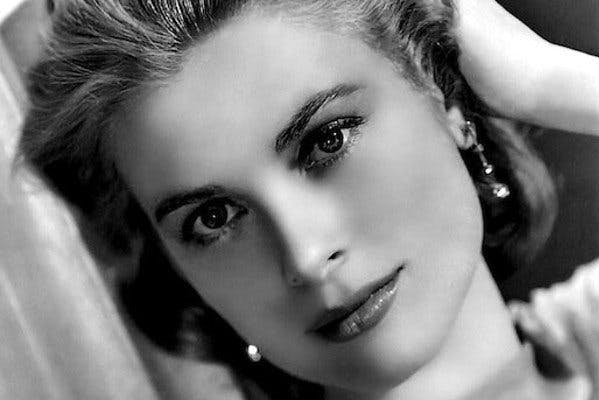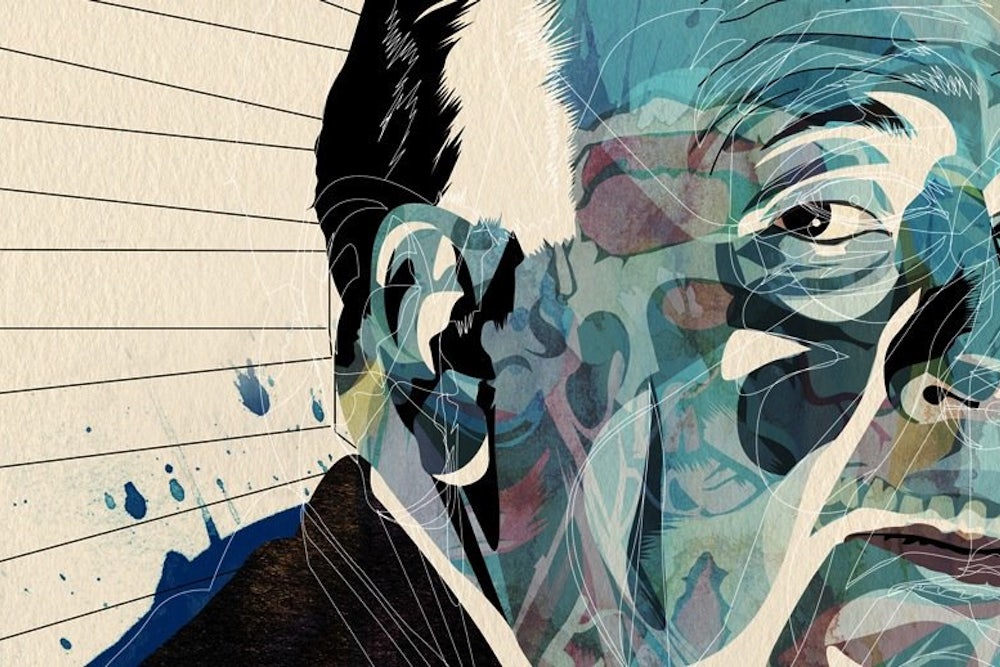The other day, two esteemed literary figures sent me a short questionnaire on Alfred Hitchcock. They wondered, do I think about him? I do.
The questions were going to a lot of people, and I don’t know what the esteemed lit figs plan to do with the survey. But what struck me was the currency of Alfred Hitchcock (1899–1980). It’s not that he has an anniversary, but those dates are telling. He has been dead more than thirty years. A group of exceptional film-makers died at about the same moment: Howard Hawks, Chaplin, Nicholas Ray, George Cukor, William Wyler, Vincente Minnelli, Douglas Sirk, King Vidor. With regret, I have to concede that those careers are now known in the halls of cinephilia but hardly anywhere else. Yet if you say “Hitch” out loud on any bus, people start looking for a bomb, or a fat man with a poker face who is studiously ignoring the search. That voice, his look, the promise, and the threat—they’re all with us still.
A package of Hitchcock’s silent films, beautifully restored by the British Film Institute’s National Archive, is traveling round the country and delighting viewers who had come to think of him as American, Technicolored, and a devotee of desperate cries and screaming music. Recently two feature films about him—The Girl and Hitchcock—had a commercial release. They weren’t any good, but someone reckoned that this director’s curious and repressed sex life was a subject for entertainment instead of biographical research. And in 2012, the poll of critics organized by Sight & Sound (it comes once a decade) determined that at long last Citizen Kane should step aside. Vertigo was the greatest film ever made.
That’s a curious shift. When it opened in 1958, Vertigo was a flop, in an age when Hitch was not accustomed to such affronts. Not long afterward, he withdrew the film, which surely helped to increase its allure. I was entranced by Vertigo in 1958, and I am fascinated by its courage still—I mean its resolve to defy the box office and expose the workings of a secretive man. But is it even the best Hitchcock film? I’d rather see Rear Window, North by Northwest, Psycho, or Notorious. That hardly matters. As soon as you mention Psycho, the cabinet of Dr. Hitchcock is ajar, allowing us to see and hear his insolent mixture of menace and contempt, murder and mischief. My problem with Vertigo’s gloom is that there are no laughs (except for the absurd ease of parking in San Francisco). When Hitch is most himself, we laugh as we cringe, and sooner or later we get the inner message—what are the movies if we don’t know whether to smile or to shudder?
When I imagined the bomb on the bus, with the fat man taking no notice, I was alluding to a big scene in Sabotage (1936), but the example is important to most of Hitchcock. He wanted to devastate us, but he preferred to stay cool and professional about it. He was confirmed in his respect for fear, like a great artist, or a great torturer. His films were experiments in what a screen, darkness, and apprehension could do, and he liked to maintain the manner of the laboratory technician, observing but himself unmoved. So part of the recklessness in Vertigo was the way a private (if not secretive) man was prepared to disclose his own disquiet over this chronic detachment. The guilty passion glimpsed in that film was of a man falling into his own sexual fascination with a story until it drowned life. Thus the greatest film ever made (for now) is a stricken admission about film itself and the fantasy it feeds on.

Hitchcock didn’t want to be caught out. As a young man in London, drawn into film through his skill as a graphic artist, he found himself a little laughed at as a highbrow, a man who studied film very closely as a narrative technology and who was ready to go to Germany to observe the most modern treatments of terror and menace. (He stole from Fritz Lang.) That was the spirit of art struggling to emerge in the form of a plump, unappealing East London boy, a greengrocer’s son, without advantages of class and education, with only seething brilliance to belie his bulk. It’s a trial run for Harold Pinter—East End, lower-middle class, Jewish, subversive, power-minded—but Pinter ended up marrying into the aristocracy and getting a Nobel. Hitch never even won an Oscar for directing. As his first American employer, David O. Selznick, said, he wasn’t quite the man you’d want to have dinner with. That London drawl was to hide a fear of being common.
So Hitch became businesslike. He married a shrewd woman in film-making, Alma Reville, and kept all her good advice for himself. (I suspect she was the only woman he ever had sex with, while dreaming of it with everyone from Ingrid Bergman to Tippi Hedren.) He became a maker of hits, a master of suspense and trembling audience-gratification. As late as 1962, when he sat down for that famous book-length interview with François Truffaut, he spoke of himself as a manipulator of emotions and a student of making money. He looked at Psycho and was proud of its profit ratio and how certain outrages had been handled (and slipped past the censor). He did not bother to discuss the torment of Norman Bates, that confirmed spectator who sometimes takes impossible actions. “It’s only a movie,” Hitch would say to keep his admirers’ feet on the ground—and to protect himself against the psychic revelations of Psycho and Vertigo, and that overlooked film The Wrong Man. But he could not stop his eyes and his mind from picturing them. He had to look.
At last, in France, he was acclaimed as an artist after decades in which the English had smiled about the way this overweight upstart with a dirty mind and meticulous movie skills made dark, teasing films but was still a lightweight. Hitch never took sides in that debate. He was fearful of coming clean, just as no peeping tom wants to be noticed in the dark—and a large part of the experience is that we are peepers not called out by the movie. So the lovely faces look out at us, and pretend not to see us. Our furtive participation is protected and privileged. It is a key to his films, but a portent of a culture in which we look at things and tell ourselves it would be futile to be involved—after all, it’s only a movie.
That special English imagination—knowing its place but superior, dirty-minded but fastidious, Jeeves done by Jack the Ripper—never deserted Hitchcock. In The Birds, when an elderly woman in tweeds tells the packed diner at Bodega Bay about bird behavior, she could be straight from his thrillers of the 1930s. That type of lady never vanished. When he first arrived in Hollywood, it was to make a country-house mystery, Rebecca, full of English or English-sounding actors. There is only one American in the picture. For decades, he liked that elocutionary tone in his people: it’s there in Cary Grant, of course, and Grant was another lower-class English boy who had reinvented himself. But Hitch liked ladies and gentlemen: he adored finishing-school sexpots like Grace Kelly who could have passed in Knightsbridge, or Monaco. It’s hard to think of movies in which he used or examined America: North by Northwest is a board game goosed into life. The villain in Vertigo is very English, and he makes San Francisco seem like Fortnum & Mason. Rear Window is not New York City but a tour-de-force set. Where is America? I don’t think we see it until Psycho, which uses actual geography, abandoned back roads, a shabby motel, and out-of-the-way towns where gruesomeness takes twenty years to surface.
More often, Hitch built sets and used back-projection cover for the outside world. He favored that ploy long after others had given it up, which made it impossible not to notice that the method conformed to his understanding of life and his feeling for characters isolated from nature or society and set down in an ordeal. So he loved Mount Rushmore in the moonlight, and a semi-desert prairie with crops where no crops would grow, and all those staircases on which ordeals are resolved—Notorious, Vertigo, Strangers on a Train, The Birds, Psycho. Whenever Hitchcock gets near a staircase, you should hold on to the arms of the seat or the hand of anyone who came with you, because you are going to have to see the thing you are afraid of seeing. You could walk out, but that would deny the perilous privilege that the dark has given you.
Why has this work lasted? Not because the plots are plausible or the characters profound—some Hitchcock pictures are as crazy as they always were: Spellbound and Rope and Stage Fright. North by Northwest is crazed or surreal, but it has no burden of gravity. It is as self-sufficient as beauty, never lingering for explanation. Hitch was dazzling in the unexpected things, but he became ponderous if he had to explain—think of the end of Psycho. He liked to ambush us, just as in Psycho his terrorism blew up our narrative habits by offing the glorious Janet Leigh before she or we are ready. And in the devastation of that shower killing (so many artful shots in so few seconds), as we struggle to recover, whom can we cling to for identification? Just that shy boy Norman who seems willing to clean the blood away. The murder in the shower is cruel and gloating. (“Mother’s not quite herself today.”) But the use of Norman as a rescuing agent is macabre. It is part of Hitchcock the strait-faced comic. And in the movies, he knew, comedy, even done in black and blood, lasts more reliably than true love, sincerity, and working your problems out. You have problems? Have you considered murder?
David Thomson is a film critic for The New Republic.
